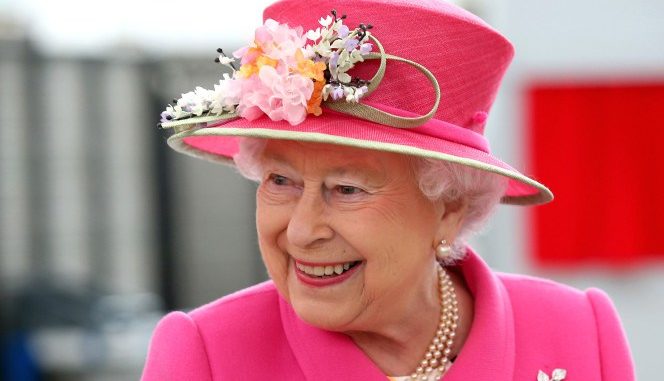
Looks like a fake BBC account reporting that the queen is dead pic.twitter.com/kVKYucUv88
— Anthony Cheung (@AWMCheung) December 29, 2016
Many people would argue that 2016 has been the year of celebrity deaths. Others might say it was the year of “fake news.” A story from Britain this week showed it could perhaps be both.
Late Thursday, a Twitter account with the handle @BBCNewsUKI sent out a message claiming Buckingham Palace had announced the death of Queen Elizabeth II, the reigning monarch of the United Kingdom. “Circumstances are unknown,” the tweet read. “More details to follow.”
The news had an air of believability: Elizabeth is 90 years old and has been in poor health recently. This year, for the first time in three decades, she failed to attend a Christmas Day church service near her country home in Norfolk after suffering what was described as a “heavy cold.” The queen has not appeared in public since she fell ill.
Additionally, if the queen were to pass away, it is the BBC that would make the announcement. In fact, Britain’s public service broadcaster is known to hold regular rehearsals in case a member of the royal family dies unexpectedly.
Thought Queen Elizabeth II had died. Told my mom. Instantly in tears, clutching her commemorative phone case. Whoops. pic.twitter.com/D3IGZKyZpW
— Helen Zook (@helenzook) December 29, 2016
The tweet, of course, was not real. @BBCNewsUKI followed up its tweet with the rather less-BBC-like message, “Love a Tuesday off if the queens dead, announce it before it’s too late.” The account was a fairly obvious fake, and it was soon suspended by Twitter.
But rumors that the queen was dead still sparked a frenzy online, with users rushing to add condolences and others attempting to verify the news.
A number of Twitter users began tweeting that there had been a “media blackout” in an attempt to hide news of the queen’s death from the public. By Friday, it was one of the top trending topics on Twitter — though many of the tweets appeared to be mocking the idea. One curious user even jogged down to Buckingham Palace to look for signs of activity. “Silly twitter,” he concluded.
https://twitter.com/StephDrumm/status/814600830850650112
Just did a jet lagged jog to the palace. It's totally quiet, nothing is going on. Silly twitter. #LongLiveTheQueen! #mediablackout pic.twitter.com/L1uqGvwO9X
— Charlie Archer (@1CharlieArcher) December 30, 2016
Such conspiratorial thinking may seem strange, but it’s understandable to an extent.
In the summer of 2015, a real BBC journalist sent out a tweet that briefly created chaos in newsrooms around the world. It read “Queen Elizabrth [sic] has died.” The reporter in question, Ahmen Khawaja, quickly deleted her tweet (and a follow up), and the BBC issued a statement that suggested the tweet had been sent during a “technical rehearsal for an obituary.”
The incident appeared to confirm that rehearsals for the death of a British monarch, long murmured about by BBC journalists, really exist.
If a “Category 1″ royal — a list which would include the queen and her husband, the Duke of Edinburgh, Prince Charles and Prince William — were to die, the BBC has to quickly pull together a remarkably complicated but somber event. Normal broadcasting would be interrupted for an official announcement — probably a statement from Buckingham Palace itself — and the national anthem.
It is also expected that all comedy on the BBC network would be canceled until the after the funeral is held, as it was after the death of King George VI in 1952.
Given the complexity of the event, journalists are expected to rehearse for it. BBC veteran Jeremy Paxman once said that in the 1970s and ’80s, journalists were expected to come in on a weekend every six months to go through the procedure for Queen Elizabeth II’s death.
“Long sets of guidelines were produced and laminated in plastic,” wrote Paxman in his book “On Royalty.” “Elaborate chains of editorial command were established in which people identified only by impenetrable acronyms would refer the news up. … Reporters would be dispatched to empty corridors and car-park basements, pretending to be at the gates of Buckingham Palace, St James’s Palace or Clarence House.”
It is unlikely, however, that a royal death would be officially announced on social media. According to Tom Sykes, the well-connected royal correspondent for the Daily Beast, the BBC will still make an official announcement about the death on its broadcast networks, as it did in 2002 for the death of the Queen Mother.
When the queen does pass away, it is likely she will be succeeded by Prince Charles, her 68-year-old son. Charles is well-known for his more provocative view of a monarch’s role. While the queen has kept her views to herself over the years, giving no interviews to journalists during her 64 years on the throne, Charles has opined publicly on an array of topics, including the rise of populism around the world and modern architecture.
Many in Britain wonder whether Charles will accept his title as king or pass it onto his son Prince William. However, Charles indicated in 2012that he was planning to take the title and that he was growing somewhat impatient. “I shall have snuffed it if I’m not careful,” he said.
-Washington Post
